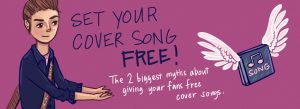
At Loudr, we often have conversations with fellow musicians about cover songs, and one of the most common things we hear is: “I’m not really interested in selling my covers; I’d rather just give them away for free.”
While this may seem like a great marketing plan, it relies on two popular, but untrue assumptions:
Myth #1. If a cover song is given away for free, permission from the copyright holder doesn’t need to be obtained.
Myth #2. If a song doesn’t generate money, a royalty doesn’t need to be paid to its songwriter.
Let’s dive into each of these myths in more detail
Myth #1. If a cover song is given away for free, permission from the copyright holder doesn’t need to be obtained.
Myth #1 is a common misconception. If you are recording a cover song, you’re required to get a license from the copyright owner, regardless of whether you are going to sell it or give it away for free.
When it comes to copyrights, a cover song actually has two separate copyrights — the copyright to the recording and the copyright to the song itself. Someone else likely owns the rights to the song itself even though you own the right to the recording of it that you’ve created.
The right of reproduction — that is, the right to make copies, including copies in the form of cover songs — is one of the six exclusive rights granted to the owner of a copyrighted work under U.S. Copyright Law. This means that the owner of a copyrighted song is the only person who has the right to make copies of that song, unless that copyright owner grants a license to someone else to make copies. This means that if you’re recording a cover song, you’re required to get a license from the copyright owner, regardless of whether you’re going to sell it or give it away.
Licensing enables you to legally sell or give away your covers, as well as promote your music without worrying about getting a cease-and-desist notice or waking up to discover that your account has been deleted because your track was abruptly yanked from all online platforms. It also makes you an awesome person because you’ll have done your part to ensure that the original songwriters get paid royalties for their hard work.
Myth #2. If a song doesn’t generate money, a royalty doesn’t need to be paid to its songwriter.
That brings us to Myth #2, another common misconception. US Copyright Law actually provides a statutory rate (typically 9.1 cents per copy or download) that a composer or designated copyright holder MUST be paid from each copy made of their copyrighted musical composition, regardless of whether that copy generated money or not.
There are some cases in which a copyright holder will choose to voluntarily waive or reduce the amount they need to be paid for the use of their compositions, but all of these involve licensing the material directly from that copyright holder. In fact, because the statutory rate in the US is a set number of cents and not a percentage of the sale amount, it does not take into account whether or not the track was sold at any particular price, including “free.”
Does that mean that if you offer your song online for free, and receive millions of free downloads, that you might be potentially liable for hundreds of thousands of dollars in royalty fees? Even though you didn’t take in any profits on the downloads?
Unfortunately, it does. And that’s one of the reasons it’s important for artists to understand the legalities of cover songs. If you see any musicians you admire doing this, please send them a link to this article.
Fun facts about copyright
1. The copyright law provides for some stiff statutory damages (as much as $30,000 or more per offense) when it comes to people who knew or probably knew that they were infringing on the rights of others.
2. The right of reproduction (and the need for a license) applies only to copyrighted material. Copyrights are protected only for a limited term, and the copyright terms, along with how the terms are calculated, vary country by country. If a composition is no longer protected by copyright law and/or definitely in the public domain, you can make your own arrangement and recording without a license.
Now that the heavy stuff is out of the way…
It’s surprisingly easy to obtain a license, and with it, peace of mind. U.S. Copyright Law provides the ability for anyone to record and sell a cover song, so long as they notify the copyright holder properly and agree to pay the statutory royalty for each copy made and distributed.
Services, like CD Baby’s partner Loudr, exist to make it easier for DIY musicians to obtain licenses for their cover songs.
AUTHOR BIOS: Jesse Buddington and Chris Crawford met through collegiate a cappella and eventually teamed up to start Loudr in order to help other artists with cover song licensing.
[hana-code-insert name=’newsletter-prmo-tips’ /]
[hana-code-insert name=’pr-music-featured’ /]